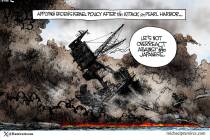What will they regulate next?
On any federal list of states generating the most hazardous waste, the windblown wastes of Nevada rank surprisingly high.
Why? Are there hundreds of secret chemical plants out there hidden behind the mesquite bushes, churning out toxic clouds of pollutants?
Of course not. All this odd statistic means is that Nevada is a mining state, and federal regulators have a tendency to categorize all mining wastes as "hazardous."
Now, some processes for refining ore certainly do use toxic chemicals, make no mistake. But most of the "toxic wastes" generated by Nevada mines are what us ignorant laymen call "rocks and dirt."
Nor are tailing piles the only example of regulatory over-reaching. The Occupational Safety and Health Administration also categorizes sand as a "hazardous material." (Workers in brick factories can breathe it in, see.)
As busy bureaucrats read their mandates expansively in order to upsize their regulatory empires, is there no limit?
Apparently not.
Come now the Sierra Club and others on the green extreme, sounding shrill alarms that another American industry continues to produce an estimated 500 million tons per year of a toxic substance that -- left untreated -- could eventually pollute the nation's waters with nitrogen and phosphorus, while also releasing such toxic gases as ammonia and hydrogen sulfide.
"When you say to people that ammonia is a toxic chemical, that makes sense to most people," explains Ed Hopkins, director of the Sierra Club's environmental quality program.
Politicians may be trying to make fun of the group's latest clean-up campaign, but it's no laughing matter, Mr. Hopkins insists. "When your drinking water supply has been polluted by phosphorus and ... you spend tens of millions of dollars to clean it up, then it becomes less funny. ... We don't think the consumers in the community should have to foot the cleanup costs," Mr. Hopkins adds.
And under the Superfund law, a cleanup is precisely what this industry must fund, Mr. Hopkins insists, as his group goes after those who annually produce the nation's 500 million tons of, um ... animal manure.
"It smells bad, you know, and there are some problems," concedes Rep. Todd Tiahrt, a Republican from the farm state of Kansas and one of 65 co-sponsors of a pending House bill that would amend the Superfund law to make it clear that animal wastes are exempt. "But if we start treating it like a hazardous waste, then a whole new set of laws kick into effect, and it drives a whole bunch of costs that I think are unnecessary."
Missouri Republican Kit Bond, backing a similar bill in the Senate, adds, "You have to see a little humor in the fact that those who want organic foods are also pushing to have regulations that will kill the industry that produces the fertilizer for organic foods."
The authors of the Superfund cleanup bill never intended manure to be regulated the same way as toxic spills and seeping dumps such as Love Canal, insists Missouri Democrat Ike Skelton, another of the bill's co-sponsors.
Rep. Skelton has a point. Any regulation that boosts the price of healthful food should be subject to a pretty rigorous cost analysis. Yes, any industry will eventually adapt, just as America's bakers knuckled under and spent millions on new "emission control systems" to prevent Americans driving by their bakeries from smelling the aroma of fresh-baked bread. (Those gases were actually a "major contaminant of concern known as a volatile organic compound," according to the "environmental protection" gang.)
But every such bizarre regulatory assault drives up costs a little more, cutting into profits, making Americans just a little poorer, and rendering domestic products less competitive on the world market.
As Will Rogers once said, "There's no trick to being a humorist when you have the whole government working for you."
No surprise: Environmentalists hope to block the "hands off manure" legislation in the Senate when it reaches the Environmental and Public Works Committee, headed by California Democrat Barbara Boxer.























